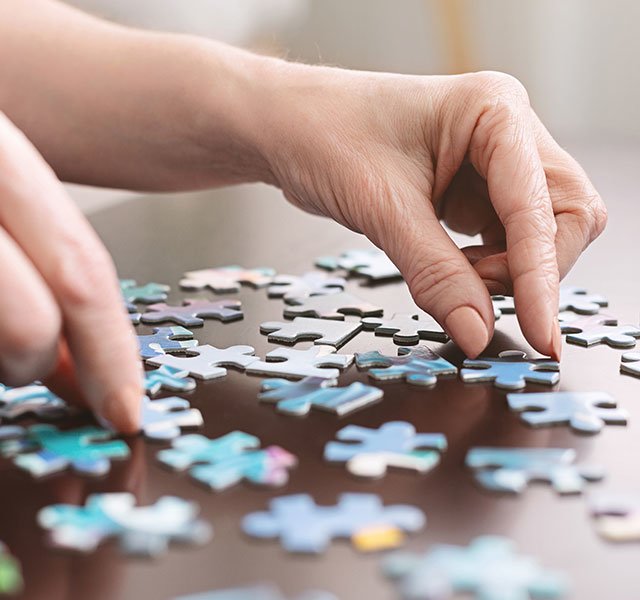When it came to busting boredom during the COVID-19 quarantine, puzzles, crosswords and board games have been a huge hit. It turns out that games can also come with a welcome side effect: They're good for your brain.
"Board games, puzzles, crosswords are more than just tools to pass the time. They engage the mind and facilitate a sense of well-being and accomplishment," says Berta Rezik, M.D., a family medicine specialist at Henry Ford Health.
Bolstering Your Brain
When the shelter-in-place order was in place, many people may have felt restless and like they're losing their minds. Even now, as more businesses open up and some restrictions are lifted in Michigan, many of us are still spending a lot of time at home and are limiting contact with others. Uncertain times are still ahead. Here, Dr. Rezik responds to a series of questions to explain why puzzles, brain games and even crosswords can act as a powerful antidote during these trying times:
Q: How does being bored and quarantined affect health and well-being?
A: Most of us know what it feels like to be bored — the waning interest and wandering mind. Add a global pandemic to the mix and it's no wonder so many people have been feeling distressed. The psychological effects of quarantine can be intense. Periods of quarantine have been linked to increased anger, irritability, anxiety, insomnia and poor concentration.
Q: What are some ways to keep the mind engaged while remaining socially distanced?
A: It's important to find ways to be mentally fit. Studies consistently show that brain games help stave off cognitive decline. But you don't have to stick with store-bought games. Get creative and make up your own -- things like scavenger hunts combined with nature walks or family trivia. It doesn't have to be complicated.
Q: Where do digital games fit in?
A: Digital games not only incorporate several players, but they can also foster social connections when players are miles apart. Plus, video games require multitasking and fast-paced information processing, both of which are important skills for children to develop. The caveat: It's important to ensure screen time for children falls within acceptable limits. Studies suggest excessive video game playing can lead to attention deficits and even addictive behaviors. A few basic guidelines for kids and digital media:
- Avoid screen time for kids who are under 2 years old.
- Restrict screen time to one hour or less for children ages 2 to 5.
- Restrict screen time over two hours for older children, and discuss media time with your kids.
Q: What are some things people can do to enhance cognitive functioning?
A: There are several simple ways you can bolster brain activity while in quarantine. Here are a few favorites:
- Learn a new fact or word every day. You can tailor words and facts to all ages and skill levels.
- Put together a jigsaw puzzle. Originally invented as a way to teach geography, jigsaw puzzles now come in seemingly endless options. They also help improve visual-spatial reasoning and short-term memory.
- Play with art. Select a masterpiece or an artist and study their methods. Better yet, start crafting your own masterpiece. Don't consider yourself a budding artist? Purchase a few coloring books or try your hand at extreme dot-to-dot workbooks.
- Learn about the solar system. If you have children, you can even recreate the basics of the solar system on their ceiling with sticker art.
Q: What about physical games?
A: Studies show that physical movement can improve working memory, response times and processing speed. There's even evidence to suggest that people learn and retain information better when movement is involved. Whenever possible, incorporate physical activity into game play, especially if you have young children. Play jump rope games, try hide and seek, or dodge ball and tag. All of these games demand engaging both body and mind.
Having Fun Despite Limitations
When it comes to staying sane and healthy during these chaotic times, it's critical to exercise your mind. Brain-stimulating activities are important for people of all ages.
With the COVID-19 restrictions, members from different generations are often stuck in the same house seemingly around the clock. The trick then becomes finding activities that involve the whole family.
"Don't limit yourself to one gaming modality," Dr. Rezik suggests. "Instead, incorporate many different types into your routine, punctuated by periods of physical exercise, to reap the most benefit."
To find a doctor at Henry Ford, visit henryford.com or call 1-800-HENRYFORD (436-7936).
Dr. Berta Rezik is a family medicine physician who sees patients at Henry Ford Medical Center - Woodhaven.



